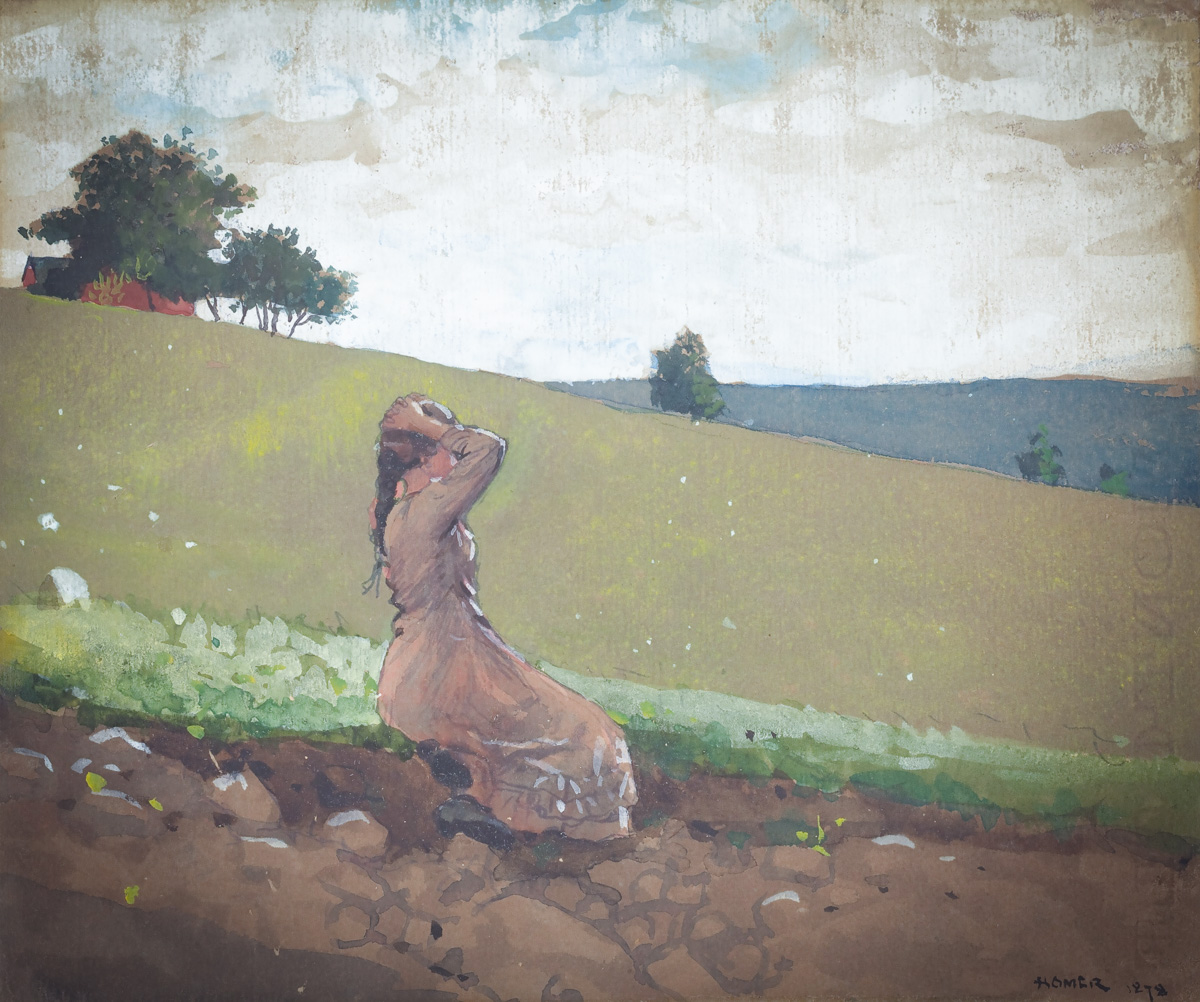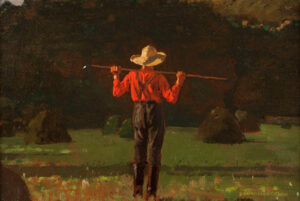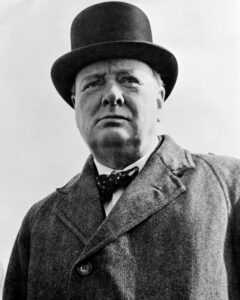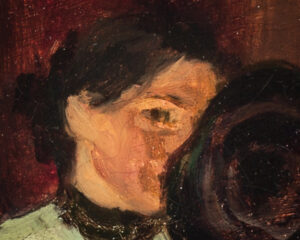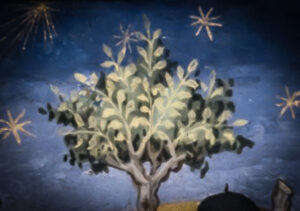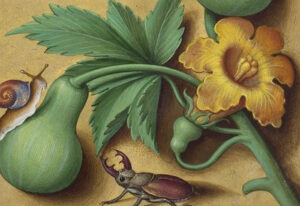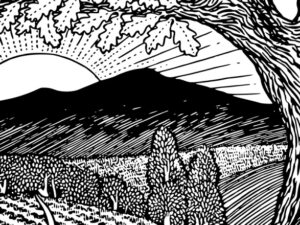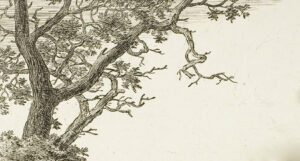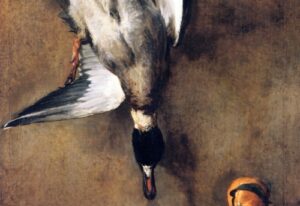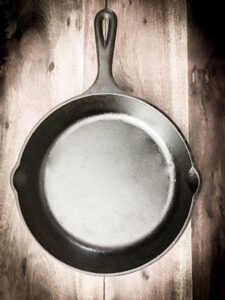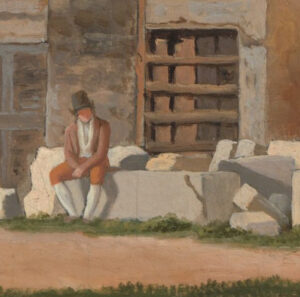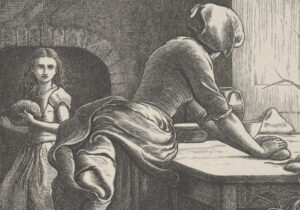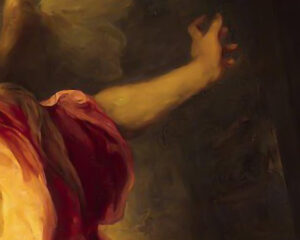—Ink and Echoes—
Rise Thou Up
excerpted from
The Seaboard Parish

George MacDonald
—1873—
Look at the death that falls upon the world in winter. And look how it revives when the sun draws near enough in the spring to wile the life in it once more out of its grave. See how the pale, meek snowdrops come up with their bowed heads, as if full of the memory of the fierce winds they encountered last spring, and yet ready in the strength of their weakness to encounter them again. Up comes the crocus, bringing its gold safe from the dark of its colourless grave into the light of its parent gold. Primroses, and anemones, and blue-bells, and a thousand other children of the spring, hear the resurrection-trumpet of the wind from the west and south, obey, and leave their graves behind to breathe the air of the sweet heavens. Up and up they come till the year is glorious with the rose and the lily, till the trees are not only clothed upon with new garments of loveliest green, but the fruit-tree bringeth forth its fruit, and the little children of men are made glad with apples, and cherries, and hazel-nuts. The earth laughs out in green and gold. The sky shares in the grand resurrection. The garments of its mourning, wherewith it made men sad, its clouds of snow and hail and stormy vapours, are swept away, have sunk indeed to the earth, and are now humbly feeding the roots of the flowers whose dead stalks they beat upon all the winter long. Instead, the sky has put on the garments of praise. Her blue, coloured after the sapphire-floor on which stands the throne of him who is the Resurrection and the Life, is dashed and glorified with the pure white of sailing clouds, and at morning and evening prayer, puts on colours in which the human heart drowns itself with delight — green and gold and purple and rose. Even the icebergs floating about in the lonely summer seas of the north are flashing all the glories of the rainbow. But, indeed, is not this whole world itself a monument of the Resurrection? The earth was without form and void. The wind of God moved on the face of the waters, and up arose this fair world. Darkness was on the face of the deep: God said, ‘Let there be light,’ and there was light.
In the animal world as well, you behold the goings of the Resurrection. Plainest of all, look at the story of the butterfly — so plain that the pagan Greeks called it and the soul by one name — Psyche. Psyche meant with them a butterfly or the soul, either. Look how the creeping thing, ugly to our eyes, so that we can hardly handle it without a shudder, finding itself growing sick with age, straightway falls a spinning and weaving at its own shroud, coffin, and grave, all in one — to prepare, in fact, for its resurrection; for it is for the sake of the resurrection that death exists. 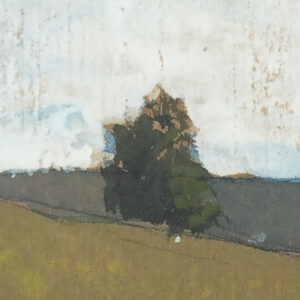 Patiently it spins its strength, but not its life, away, folds itself up decently, that its body may rest in quiet till the new body is formed within it; and at length when the appointed hour has arrived, out of the body of this crawling thing breaks forth the winged splendour of the butterfly — not the same body — a new one built out of the ruins of the old — even as St. Paul tells us that it is not the same body “we” have in the resurrection, but a nobler body like ourselves, with all the imperfect and evil thing taken away. No more creeping for the butterfly; wings of splendour now. Neither yet has it lost the feet wherewith to alight on all that is lovely and sweet. Think of it — up from the toilsome journey over the low ground, exposed to the foot of every passer-by, destroying the lovely leaves upon which it fed, and the fruit which they should shelter, up to the path at will through the air, and a gathering of food which hurts not the source of it, a food which is but as a tribute from the loveliness of the flowers to the yet higher loveliness of the flower-angel: is not this a resurrection? Its children too shall pass through the same process, to wing the air of a summer noon, and rejoice in the ethereal and the pure . . . .
Patiently it spins its strength, but not its life, away, folds itself up decently, that its body may rest in quiet till the new body is formed within it; and at length when the appointed hour has arrived, out of the body of this crawling thing breaks forth the winged splendour of the butterfly — not the same body — a new one built out of the ruins of the old — even as St. Paul tells us that it is not the same body “we” have in the resurrection, but a nobler body like ourselves, with all the imperfect and evil thing taken away. No more creeping for the butterfly; wings of splendour now. Neither yet has it lost the feet wherewith to alight on all that is lovely and sweet. Think of it — up from the toilsome journey over the low ground, exposed to the foot of every passer-by, destroying the lovely leaves upon which it fed, and the fruit which they should shelter, up to the path at will through the air, and a gathering of food which hurts not the source of it, a food which is but as a tribute from the loveliness of the flowers to the yet higher loveliness of the flower-angel: is not this a resurrection? Its children too shall pass through the same process, to wing the air of a summer noon, and rejoice in the ethereal and the pure . . . .
Look how the creeping thing . . . falls a spinning and weaving at its own shroud, coffin, and grave, all in one — to prepare, in fact, for its resurrection; for it is for the sake of the resurrection that death exists.
Think, then, of all the deaths you know; the death of the night, when the sun is gone, when friend says not a word to friend, but both lie drowned and parted in the sea of sleep; the death of the year, when winter lies heavy on the graves of the children of summer, when the leafless trees moan in the blasts from the ocean, when the beasts even look dull and oppressed, when the children go about shivering with cold, when the poor and improvident are miserable with suffering or think of such a death of disease as befalls us at times . . . think of all these, think of them all together, and you will have but the dimmest, faintest picture of the death from which the resurrection of which I have now to speak, is the rising . . . .
If into the face of the dead body, lying on the bed, waiting for its burial, the soul of the man should begin to dawn again, drawing near from afar to look out once more at those eyes, to smile once again through those lips, the change on that face would be indeed great and wondrous, but nothing for marvel or greatness to that which passes on the countenance, the very outward bodily face of the man who wakes from his sleep, arises from the dead and receives light from Christ. Too often indeed, the reposeful look on the face of the dead body would be troubled, would vanish away at the revisiting of the restless ghost; but when a man’s own right true mind, which God made in him, is restored to him again, and he wakes from the death of sin, then comes the repose without the death . . . . The mammon-eyes, hitherto fixed on the earth, are lifted to meet their kind; the lips that mumbled over figures and sums of gold learn to say words of grace and tenderness. 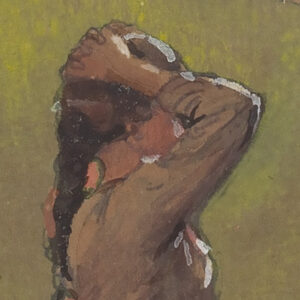 The truculent, repellent, self-satisfied face begins to look thoughtful and doubtful, as if searching for some treasure of whose whereabouts it had no certain sign. The face anxious, wrinkled, peering, troubled, on whose lines you read the dread of hunger, poverty, and nakedness, thaws into a smile; the eyes reflect in courage the light of the Father’s care, the back grows erect under its burden with the assurance that the hairs of its head are all numbered. But the face can with all its changes set but dimly forth the rising from the dead which passes within. The heart, which cared but for itself, becomes aware of surrounding thousands like itself, in the love and care of which it feels a dawning blessedness undreamt of before.
The truculent, repellent, self-satisfied face begins to look thoughtful and doubtful, as if searching for some treasure of whose whereabouts it had no certain sign. The face anxious, wrinkled, peering, troubled, on whose lines you read the dread of hunger, poverty, and nakedness, thaws into a smile; the eyes reflect in courage the light of the Father’s care, the back grows erect under its burden with the assurance that the hairs of its head are all numbered. But the face can with all its changes set but dimly forth the rising from the dead which passes within. The heart, which cared but for itself, becomes aware of surrounding thousands like itself, in the love and care of which it feels a dawning blessedness undreamt of before.
The heart, which cared but for itself, becomes aware of surrounding thousands like itself, in the love and care of which it feels a dawning blessedness undreamt of before.
From selfishness to love — is not this a rising from the dead? The man whose ambition declares that his way in the world would be to subject everything to his desires, to bring every human care, affection, power, and aspiration to his feet — such a world it would be, and such a king it would have, if individual ambition might work its will! if a man’s opinion of himself could be made out in the world, degrading, compelling, oppressing, doing everything for his own glory! — and such a glory! — but a pang of light strikes this man to the heart; an arrow of truth, feathered with suffering and loss and dismay, finds out — the open joint in his armour, I was going to say — no, finds out the joint in the coffin where his heart lies festering in a death so dead that itself calls it life. He trembles, he awakes, he rises from the dead. No more he seeks the slavery of all: where can he find whom to serve? how can he become if but a threshold in the temple of Christ, where all serve all, and no man thinks first of himself? He to whom the mass of his fellows, as he massed them, was common and unclean, bows before every human sign of the presence of the making God. 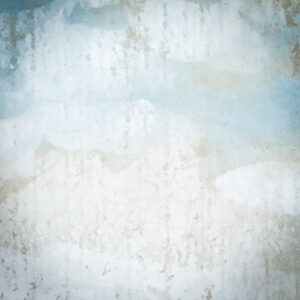 The sun, which was to him but a candle with which to search after his own ends, wealth, power, place, praise — the world, which was but the cavern where he thus searched — are now full of the mystery of loveliness, full of the truth of which sun and wind and land and sea are symbols and signs. From a withered old age of unbelief, the dim eyes of which refuse the glory of things a passage to the heart, he is raised up a child full of admiration, wonder, and gladness. Everything is glorious to him; he can believe, and therefore he sees. It is from the grave into the sunshine, from the night into the morning, from death into life . . . .
The sun, which was to him but a candle with which to search after his own ends, wealth, power, place, praise — the world, which was but the cavern where he thus searched — are now full of the mystery of loveliness, full of the truth of which sun and wind and land and sea are symbols and signs. From a withered old age of unbelief, the dim eyes of which refuse the glory of things a passage to the heart, he is raised up a child full of admiration, wonder, and gladness. Everything is glorious to him; he can believe, and therefore he sees. It is from the grave into the sunshine, from the night into the morning, from death into life . . . .
Awake, then, thou that sleepest, and arise from the dead, and Christ will give thee light. As the harvest rises from the wintry earth, so rise thou up from the trials of this world a full ear in the harvest of Him who sowed thee in the soil that thou mightest rise above it. As the summer rises from the winter, so rise thou from the cares of eating and drinking and clothing into the fearless sunshine of confidence in the Father. As the morning rises out of the night, so rise thou from the darkness of ignorance to do the will of God in the daylight; and as a man feels that he is himself when he wakes from the troubled and grotesque visions of the night into the glory of the sunrise, even so wilt thou feel that then first thou knowest what thy life, the gladness of thy being, is. As from painful tossing in disease, rise into the health of well-being. As from the awful embrace of thy own dead body, burst forth in thy spiritual body. Arise thou, responsive to the indwelling will of the Father, even as thy body will respond to thy indwelling soul.
